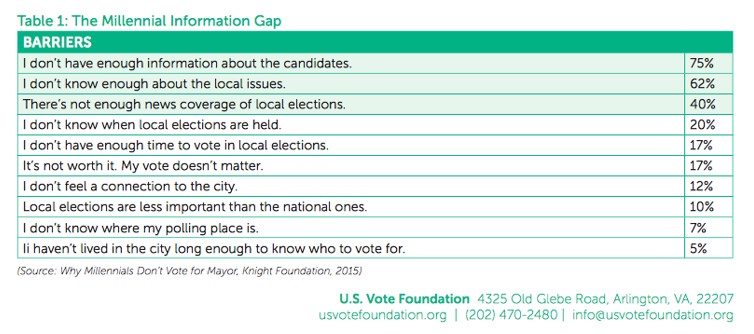Nancy Ramirez
WHEN SHOULD WE VOTE?
When do people vote?
Elections don’t just happen every four years! Many registered voters only vote every four years, despite elections occurring approximately every year. There are both federal and local elections that happen annually. The highest voter turnout occurs during presidential elections. Voter turnout for presidential and midterm elections ranges from 40-60%[1], and for local elections it is much lower.
Why do local elections receive lower turnout?
Low voter turnout is due to many factors; registration is not one of them. In fact, registration has increased tremendously due to organizations focused on civic engagement. However, voter registration does not equal participation. Voter turnout in local elections has heavily decreased over the pasts years. From 2004 to 2016 voter turnout was 30% vs 60% in federal elections[2].
The first factor is that local elections receive less promotion, and often individuals do not even know that elections are taking place. Individuals are often unaware of election dates (this can be caused due that elections occur on off years or because of unplanned special elections), and possible candidates are unaware of eligibility and deadlines. Secondly, individuals do not think local elections have the same impact as federal elections.
An individual will have more contact with his local officials than he does with federal officials. Local officials are in charge of enforcing and passing state laws, and upholding residents to laws. However, despite the bigger impact local officials have on daily life, voter turn out for local elections is less than voter turnout for a federal election.
Why is it that people don’t vote in local elections?
Local elections can require more time from every voter. Since they do not happen at the same time as presidential elections, the individual often has to search for election dates. In addition, on the state level there are often more candidates, therefore requiring more research in order to be an informed voter. Many voters lack the time to invest into these elections, which contributes to low voter turnout.

What are you voting for in a local election?
- Mayor—Mayors are responsible for the laws and ordinances of a particular city. There is a mayor per city. Mayoral elections take place every four years.
- Local officials—Local officials are the people we deal with on a daily basis. They are in charge of county and municipal governments. This includes the judges in local courts, council members, district attorneys, sheriffs and council members.
These are the local officials that are voted into office in local elections. They have a direct impact on the everyday life of residents.
What can be done to reduce this gap?
Make sure your voting registration is up to date. Update your address to make sure your polling place is still the same.
The main way to increase voter turnout in local elections is to stay informed and share it with your friends and family to keep them informed. There are a couple of ways you can stay informed. First, you can research on your own. Secondly, you can follow your city and state government sites that post elections updates. In addition, you can follow sites that promote civic engagement and provide information on current and future elections. Below are some organizations you can follow to keep you informed on elections occurring in Georgia:
- My Voter Page—Georgia Secretary of State – You can use this site to check if you are registered to vote, to see your polling place, elected officials, and ballots of upcoming elections.
- 2019 – 2020 ELECTIONS AND VOTER REGISTRATION CALENDARS
- Atlanta City Council – Use this site to stay informed about current elections happening in Atlanta.
Current Local Elections in Georgia
This year in Georgia it is an off-year election year, which means that neither a presidential or midterm election is taking place. However, there are many local elections happening. These elections are held at county and municipal levels. In this election you will be voting for local officials that help operate your city such as: mayor, city council members, and district attorney. In addition, some local elections include voting on referendums. The referendums could affect things such as your local tax, public services, and business regulations. On November 5, 2019 the following counties will have local elections:
Counties:
- Clayton County
- Cherokee County
- Cobb County
- DeKalb County
- Fayette County
- Fulton County
- Gwinnett County
- Henry County
These counties will be voting for city mayors, and city council members. In addition, some cities will vote on tax exemptions, and referendums to update current policies.
These elections will take place on November 5,2019 from 7:00 am- 7:00 pm. However, early voting has started, click here to look up early voting polls and a sample ballot of your city.
References
“Congressional, State, and Local Elections.” USA.gov, USA.Gov, 23 Aug. 2019,
FairVote.org. “Voter Turnout.” FairVote, NationBuilder,
“Fixing the Problem of Low Voter Turnout in US Local Elections: A Data-Driven Solution.” LOCelections – A New Initiative of U.S. Vote Foundation | U.S. Vote Foundation, U.S. Vote Foundation, www.usvotefoundation.org/LOCelections-ExecSumm.
Stewart, Emily. “2018’s Record-Setting Voter Turnout, in One Chart.” Vox, Vox, 19 Nov. 2018, www.vox.com/policy-and-politics/2018/11/19/18103110/2018-midterm-elections-turnout.
“Welcome to the Georgia General Assembly!” Georgia General Assembly, Georgia General Assembly, www.legis.ga.gov/en-US/default.aspx.
.
[1] Stewart, Emily. “2018’s Record-Setting Voter Turnout, in One Chart.” Vox, Vox, 19 Nov. 2018.
[2] Fixing the Problem of Low Voter Turnout in US Local Elections: A Data-Driven Solution.” LOCelections – A New Initiative of U.S. Vote Foundation | U.S. Vote Foundation, U.S.
NOTE: The opinions expressed in this blog are the opinions of the author only. It is not to be assumed that the opinions are those of GALEO or the GALEO Latino Community Development Fund. For the official position on any issue for GALEO, please contact Jerry Gonzalez, Executive Director of GALEO at jerry@galeo.org.
